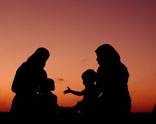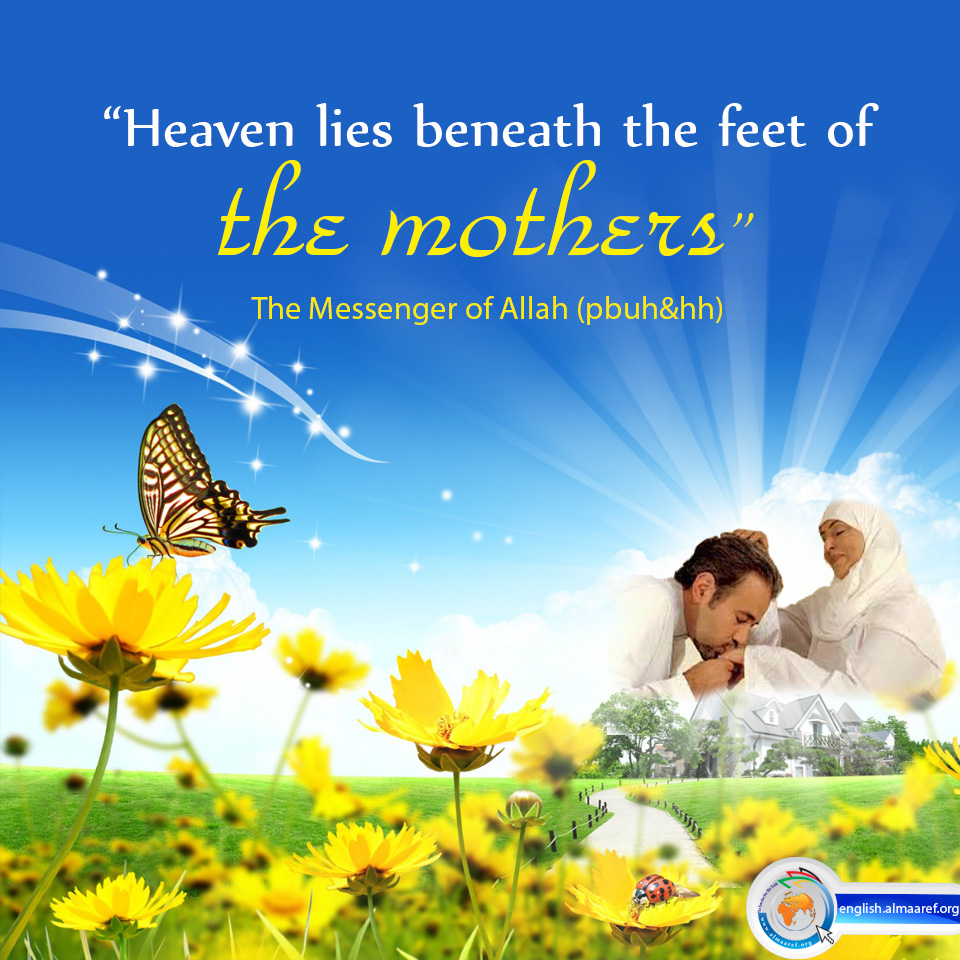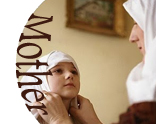Her Role as a Mother
What Is a “Mother”?
“Mother” is an exceptional word which leaves a deep impact in the soul of the human being, arouses passions, and evokes softness, warmth, and tenderness. How logical is the deep impact that this word leaves in the soul of the human being?
When we refer to the sacred religion, we find many doctrinal texts which refer to the mothers and thus arouse this deep affection towards the mother and direct the human being towards it. This affection binds the child to his mother in a way which assists her to perform her duties on one hand and which serves as a kind of gratitude towards her on the other hand. From these narratives, we mention the following:
1- The Heaven Is under the Feet of the Mothers
It is related that The Noblest Prophet (God’s prayers and peace bestowed upon him and his Household) said in his well known discourse, “The heaven is under the feet of the mothers.”1 The term “under the feet of” indicates service and humbleness i.e. serving the mother and being humble with her open the door for the child towards the Heaven of Immortality.
2- Recommendation with Filial Dutifulness towards Her
It is related that when The Noblest Prophet (God’s prayers and peace bestowed upon him and his Household) was asked about the due of the mother, he (God’s prayers and peace bestowed upon him and his Household) answered, “Had he [wanting the child] served her as much as the number of the sands of Ajj and the drops of the rain of all the days of this life are, he would not have paid her the due of a day during which she carried him in her womb…”2
This narrative, in addition to the other ones which highly stress the due of the mother, indicates at the same time that serving her is not a favor from the child on her but that this service is her right.
So, why is she granted this prestige? And how is it that the mother deserves all of this?
The Reason of the Mother’s Prestige
The following noble verse reflects upon the prestige which The Most High God granted to the mother and the reason for her deserving of this prestige. The Most High God says, ﴾And lower unto them the wing of submission and humility through mercy, and say, “My Lord! Bestow on them Your Mercy as they did bring me up when I was small﴿3.
The child is born weak, so he is in need for someone to be kind with him and to give him for free. He needs to eat, to dress, and to be protected from coldness and hotness. He also needs someone to hold his hand and to teach him about his interests and to guide him to the way of achieving them. He needs all of this at the same time he is unable to give anything in return but a little smile which tickles the mother’s heart and a hope which fills her heart about her baby’s flourishing future.
In The Letter of Dues, Imam Ali Zein Al-Abideen (God’s peace bestowed upon him) explained this in saying, “She carried you where nobody carries anybody. She gave you from the fruit of her heart what nobody gives anybody. She protected you with all her organs. She did not care that she would be hungry in order that you be fed; be thirsty in order that you be quenched; be naked in order that you be dressed; and be under the sun in order that you be shaded. She did not care that she forsook sleep for your sake. And she protected you from the hotness and coldness, so that you would be for her…”
Nobody can offer what the mother offers to her child. His house was in her interior, and his food was from her blood: Nobody else can offer this!! Imam Zein Al-Abideen (God’s peace bestowed upon him) said, “…You will not be able to show gratitude to her as she deserves unless by God’s Help and Successfulness.”
Whatever the child offers, the mother remains to be the one most offering.
How Does She Carry This Responsibility?
The mother’s carrying of the responsibility passes through several stages, as the just mentioned words of Imam Zein Al-Abideen (God’s peace bestowed upon him) indicate them one stage after another.
1- Pregnancy
The Most High God says, ﴾And we have enjoined on man (to be dutiful and good) to his parents. His mother bore him in weakness and hardship upon weakness and hardship, and his weaning is in two years give thanks to Me and to your parents, unto Me is the final destination﴿4.
Happily and welcomingly does the woman carry her baby during the period of pregnancy in spite of all the weakness which befalls her: ﴾…weakness and hardship upon weakness and hardship…﴿. It is a kind of struggle for God’s sake: If the mother dies because of pregnancy, she is considered to be a martyr and is going to be resurrected [on the Day of Judgment] in the prestige of the martyrs, as is understood from some narratives. It is ascribed to Ibn Baseer in turn to Imam Al-Sadik (God’s peace bestowed upon him) in turn to The Most High God in a sacred talk in the tale of Adam and Hawwaa that He said, “…O Hawwaa! I will group with the martyrs every woman who dies while she is conceiving. O Hawwaa! I will grant the reward of a martyr for every woman who is in labor: If she is safe and gives birth to her baby, I will forgive her for all her sins even if they are as much as the foam of the sea and the sands of the land and the leaves of the trees are. If she dies, she will become a martyr; and when her soul is taken away, the angels will be present at her and will harbinger her with Heaven…”5
This is, therefore, the first responsibility which the mother tolerates.
2- Breastfeeding
The Most High God says, ﴾The mothers shall give suck to their children for two whole years, for those (parents) who desire to complete the term of suckling, but the father of the child shall bear the cost the mother’s food and clothing on a reasonable basis…﴿6
Breast feeding is one of the child’s rights which must not be neglected since it affects the mental and psychological formation of the human being. The just mentioned noble verse refers to the duration of the breast feeding i.e. two complete years, and the year here is a lunar one.
In a narrative which demonstrates the reward of breastfeeding, God’s prophet (God’s prayers and peace bestowed upon him and his Household) said, “When the woman is pregnant, she is in the status of the one fasting, staying up nights [in prayer and prostration], and sacrificing himself and his money for God’s sake. When she conceives, she has a reward which is so great to the extent that nobody knows it. When she is breastfeeding, she, with every single suck, is considered as if she is liberating one of Ismael’s progeny. And when she is done with breastfeeding, a noble angel says to her, ‘Go on what you are doing: you are forgiven.’”7
3- Instruction and Guidance
The mother is the closest person to the child and the one who is dedicated to his affairs. She is, therefore, the one who is the most influential and capable of instructing and guiding him.
All these points are reflected in the narrative ascribed to God’s prophet (God’s prayers and peace bestowed upon him and his Household) when one man complained to him about his mother’s ill nature. He (God’s prayers and peace bestowed upon him and his Household) said to the man, “She was not ill tempered when she carried you for nine months, breast fed you for two years, and stayed up her night and thirsted her day for your own sake…”
From here, the mother is the real educator and the first school which the child attends. Then, how is education fulfilled?
Aims of Education
Education aims at widely opening the gates of the future in front of the child. This is fulfilled, at the first rate, through instructing him to redeem his final destiny in the hereafter. The Most High God says, ﴾O you who believe! Ward off from yourselves and your families a Fire whose fuel is men and stones, over which are (appointed) angels stern (and) severe, who disobey not, (from executing) the Commands they receive from Allah, but do that which they are commanded﴿8.
First: Learning
It is related in the narrative ascribed to The Prophet (God’s prayers and peace bestowed upon him and his Household) that he said, “If the teacher says to the boy, ‘In the Name of God,’ God grants him [the teacher] and the boy and his parents freedom from Fire.”9
Second: Piety
Piety is mentioned in The Noble Qur’an as a cause and a justification for worship: ﴾O mankind! Worship your Lord, Who created you and those before you so that you may become the pious﴿10.
Islam attaches a special importance to piety because it represents the psychological door which helps the human being to confront the tests and afflictions of this life. It also represents the armor, on the thresholds of which fall all the deceptions of Satan, all the seducements of this life, and all the allurements of the calling for evil souls.
Methods of Education
There are various methods of education which vary with the capacities and the age of the child and which differ with the topic under discussion. Here, we are going to refer to three major methods.
1- The Indirect Instruction Method
Perhaps this method is the very first method followed by the child because he is unable to receive the instruction messages and to abide by them. Therefore, the mother has to direct the child towards righteousness and to keep him away from corruption through presenting proper alternatives which can occupy him, in order that he will not be led on towards what is corrupted, a psychological barrier will be established between him and corruption, and a model will be set forth for him in order to follow after in this frame.
It is indispensable that the mother be aware that she is her child’s first model and that she has to instruct him through her deeds before anything else; and this is the major method which the mother must follow. In spite of its being the only method throughout the years of the childhood of the human being, this method is requisite as well at all the stages and is beneficial with all ages.
It is related in the narrative ascribed to Imam Al-Sadik (God’s peace bestowed upon him) that he said, “Let your child play for seven years and be educated for another seven years. And let him accompany you for another seven years.”11 Leaving him to play for the first seven years does not at all mean neglecting him; this is in fact in consistency with the indirect instruction even through playing.
2- The Direct Instruction Method
In fact, it represents the admittance into the stage of the scholarly recognition where the human being learns, in accordance to his age and capability, to distinguish between the good and the evil, between the righteousness and the corruption. This issue is also, at a specific stage, indispensable, so that the human being will not get accustomed to the method of following the practical instruction only without any scholarly standards because he may, without these standards, fall down before any test or any environments.
3- Instruction of the Causes and the Consequences Method
The child must be acquainted with the consequences of the deeds and the causes of the goodness or badness of these deeds. Moreover, he must be associated as much intricately as possible to the hereafter; and he must be made to consider the consequences and the reflection of his deeds in the hereafter.
The mother must master these methods in order to be able to apply them properly, so that she will produce a good child for society. She must always turn towards The Most High God: ﴾...O my Lord! Grant me from you a good offspring. You are indeed The All Hearer Of Invocation﴿12.
Indispensable Characteristics
In order that the mother will succeed in the education message which she wants to deliver, there are certain basic characteristics which it is indispensable for her to be endowed with. They are summarized in the following points:
1- Showing Love and Tenderness
Showing love and tenderness to the child is of the mother’s nature and absolutely not something artificial. The mother’s attachment to the child is crystal like in the exchanged affection and is thus indisputable. It is clearly manifested in the story of Musa’s (God’s peace bestowed upon him and upon our Prophet and his Household) mother where The Most High God relates about her, ﴾And we inspired the mother of Musa (saying): “Suckle him, but when you fear for him, then cast him into the river and fear not nor grieve. Verily! We shall bring him back to you and shall make him one of the Messengers * And the heart of the mother of Musa became empty (from every thought except the thought of Musa). She was very near to disclose his (case i.e. the child is her son) had We not strengthened her heart (with faith), so that she might remain as one of the believers * So did We restore him to his mother, that she might be delighted, and that she must not grieve, and that she might know that the Promise of Allah is true. But most of them know not﴿13.
The mother must show to her child this love which dwells in the heart of each mother. It is ascribed to The Prophet (God’s prayers and peace bestowed upon him and his Household) that he said, “Kiss your children a lot. For each kiss, you are rewarded with a degree in the Heaven where there are five hundred years between each degree and degree.”14
2- Tolerance and Patience
The mother must be characterized by great tolerance and patience, so that she will be able to properly perform her positive role in bringing up the child. Impatience results in a lot of complications on the psychological and educational levels.
The mother must in addition be well aware of the peculiarity of her child and must know that his behaviors, especially which annoy her like the weeping for example, are very natural and are expressive of good health, and perhaps the lack of such behaviors is a sign of illness.
From here, she must get used to taking in these issues, so that they will not reflect negatively on her nerves.
It is ascribed to The Prophet (God’s prayers and peace bestowed upon him and his Household) that he said, “Do not hit your babies because of their weeping. Their weeping during four months is a testimony of ‘There is no god but God,’ during [the next] four months is a bestowal of prayers on The Prophet and his Household, and during [the next] four months is a supplication for their parents.”15
3- Equality
The mother must be at one distance from all her children i.e. she must not distinguish among them in a manner that might negatively reflect on them. It is ascribed toThe Prophet (God’s prayers and peace bestowed upon him and his Household) that he said, “God will admit to Heaven the one who has a daughter yet neither gets rid of her nor dispraises her or prefers his son to her.”16
It is also related that God’s prophet (God’s prayers and peace bestowed upon him and his Household) looked at one man who had two sons yet he kissed one and did not kiss the other one. At that, The Prophet (God’s prayers and peace bestowed upon him and his Household) said to him, “Would you treat them equally?!”17
When we refer to the sacred religion, we find many doctrinal texts which refer to the mothers and thus arouse the deep affection towards the mother and direct the human being towards it.
Nobody can offer what the mother offers to her child. His house was her interior, and his food was from her blood: Nobody else can offer this. Imam Ali Zein Al-Abideen (God’s peace bestowed upon him) said, “…You will not be able to show to her the gratitude she deserves unless by God’s Help and Successfulness.”
The mother’s carrying of the responsibility passes through several stages:
1- Pregnancy
2- Breastfeeding
3- Instruction and Guidance
Education must be based on two issues. The first one is learning, and the second one is piety.
Methods of Education
1- The Indirect Instruction Method
2- The Direct Instruction Method
3- Instruction of the Causes and the Consequences Method
The characteristics which the educating mother must be endowed with are: showing of love and tenderness, tolerance and patience, equally dealing with and showing affection to all her children.
1- Talk about Islam’s look towards the mother.
2- Why does Islam attach such an importance to maternity?
3- What are the responsibilities which the woman is charged with?
4- What must the educating of the children be based on?
5- Mention some correct methods of education.
Fatima ibnat Al-Naser
She goes back in her blessed lineage to The Prince of the Believers Imam Ali ibn Abi Taleb (God’s peace bestowed upon him). She is the mother of the two reverent Sayyids and the great and noble scholars Mohammad Al-Ra’dee, the collector of The Path of Eloquence, and Ali Al-Mourtada, one of the well known ancient scholars.
This noble Alaweeyyeet [in reference to Imam Ali ibn Abi Taleb] woman had a luxurious life since she was not poor; however, this did not prevent her from being the most pious one among the women of her time. How would not she, being the daughter of Al-Naser who was known as Abdulhak [The Servant of The Truth] and who was master of Al-Talebyeet [also in reference to Imam Ali ibn Abi Taleb] at his time, be so?
Ibn Abi Al-Hadeed relates an impressive story: “Fakhar ibn Mee’ad Al-Alawi Al-Mousawi (May God’s Mercy be bestowed upon him) said, “The jurisprudence Imam Al-Moufeed Abdullah Mohammad ibn Al-Naaman had a dream in which as if Fatima the daughter God’s prophet (God’s prayers and peace bestowed upon him and his Household) called on him while being in his mosque in Al-Karkh; she was taking along with her little Al-Hassan and Al-Houssein (God’s peace bestowed upon both). She handed them to him and said, ‘Teach them jurisprudence.’ He woke up astonished of the dream he had.”
“When the day of that night during which he had the dream broke, Fatima the daughter Al-Naser with her attendants and her little sons Mohammad Al-Ra’dee and Ali Al-Mourtada called on him in the mosque. He moved up, went towards them, and saluted them. Then, she said to him, ‘O Sheikh, I have brought my two sons, so that you will teach them jurisprudence.’ At that, Abou Abdullah wept and narrated for them the dream he had had.”
“He taught them jurisprudence, and God bestowed His bounties upon them and opened in front of them the door of knowledge and merits which have been well known about them across the world and which will remain as long as time will.”
This tender mother (May God be pleased with her) bid farewell to this evanescent life after she had been assured as regards her sons and after she had been delighted with them. She passed away on Sacred Thou Al-Houjja, 385 of immigration when Al-Shareef Al-Mourtada was 30 years old and his brother Al-Shareef Al-Ra’dee was 26 years old.
Al-Shareef Al-Ra’dee wrote on her an elegy made up of 68 verses and rhymed with the Arabic sound “æ”. It starts with:
I am lamenting you with the hope that my grief be quenched
I am talking about you with the hope that my disease be cured
And I seek condolence in the promising patience
With the hope that in the promising patience be my condolence



















